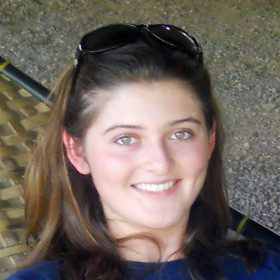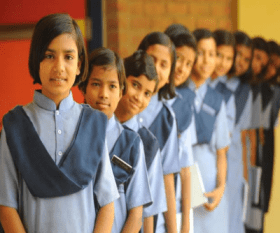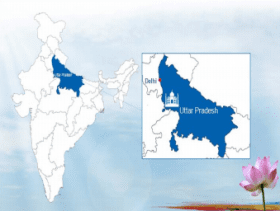 Melissa Theiss, a junior psychology concentrator at Harvard College, will be interning this summer at VidyaGyan with support from a SAI internship grant.
Melissa Theiss, a junior psychology concentrator at Harvard College, will be interning this summer at VidyaGyan with support from a SAI internship grant.
VidyaGyan is a school for rural underprivileged students in Bulandshahr, Uttar Pradesh, India that takes an innovative approach to providing transformational education for students from 6th to 12th grades. The vision of the VidyaGyan schools is to build future leaders from rural India, using high quality school education as a tool to bridge the rural-urban divide. This is the third year that SAI has awarded an internship grant for VidyaGyan.
SAI talked to Melissa about her upcoming summer in South Asia and what she hopes to gain from the experience:
Q: Can you talk a little about your background, and what you’re involved in at Harvard?
Melissa: I’m a junior, and a Psychology concentrator, and I have a language citation in Spanish. I studied abroad for a semester in Spain, in Sevilla, and it was wonderful. I also studied abroad in Italy during one of my summers, and I worked in an elephant camp during my freshman summer in Thailand. So I have very much tried to make my summers very diverse. When I was in high school, I was at the Center for International Studies, and I really want to work, post-graduation, either on a traveling fellowship, or for some kind of nonprofit that does international work.
Q: Why did you choose VidyaGyan as a place to work this summer?
Melissa: For a couple of reasons. One is that I’m really interested in teaching. I’m going to apply for a Fulbright scholarship, and I’m also currently cross-registered in several classes in the Graduate School of Education. I really liked how working at VidyaGyan was like not only working at a social initiative, where I’m able to do a lot of work with non-profit type ideas, but also that I get to interact with students. One of the things that is really cool about VidyaGyan is that they tailor each experience to their intern’s specific talents, based on what they want out of the experience. Also, gender relations are still a huge issue there, so they particularly like having a female intern. [VidyaGyan is a co-ed school].
 In India, everyone takes an exam, and this school is made up of the top 5 to 10 percent of students based on exam scores, and of that, the subset who are in the lowest 10 to 20 percent socioeconomic status, and they go there on scholarships. The idea is that by taking a very small number of students, they are transforming the opportunities available to them. This will have an impact on villages, and those students will go back and support their own community. A lot of them will apply to American universities, so we [the interns] can tell them what their life might be like.
In India, everyone takes an exam, and this school is made up of the top 5 to 10 percent of students based on exam scores, and of that, the subset who are in the lowest 10 to 20 percent socioeconomic status, and they go there on scholarships. The idea is that by taking a very small number of students, they are transforming the opportunities available to them. This will have an impact on villages, and those students will go back and support their own community. A lot of them will apply to American universities, so we [the interns] can tell them what their life might be like.
Q: So day-to-day, what will be your role at VidyaGyan?
Melissa: I will be teaching a communications strategy course to the teachers. Every Friday, I will be doing a Travel Log series, where I will be featuring a different city that I have studied in, because many of the students haven’t had the opportunity to travel a lot. So I will show them places all over the world, and do some cultural activities.
They [school administrators] also really want students to be more involved in humanitarian work, and because I started a non-profit in high school, they want me to work with students to develop either a non-profit or a humanitarian initiative that will be student-run eventually. So I will work with a small subset of students to tailor it and figure out how to make it sustainable.
Q: Do you think VidyaGyan is different from other schools that work with students in rural areas?
Melissa: I think VidyaGyan is different from a lot of other schools that offer internships to Harvard students, because a lot of them have one goal in mind: to send their students to elite institutions, so a lot of them will use Harvard, Yale, or students at other well-known institutions throughout the world, to prep their students to take the SATs, and the TOEFl, and write essays. A lot of what an intern would do, would be to gear them towards getting into college.
What is very different about VidyGyan is that they know that this will be the path for some of their students, but not all of them, and the internship is very different, in that it is more exploratory, and to help them explore their options, and empower them to do what they want. The school encourages them to create their own opportunity.
Q: The school works with poor students. How do you think that plays into its goals and successes?
Melissa: The students at VidyGyan are extremely committed. There are no disciplinary problems. The students get up at 5 to do work, and they work the entire day. That is really compelling, when you have a subset of students who – I don’t know if it’s gratitude, or what the motivating force is behind it, but their lives have been drastically changed by the time they have been at the school.
And it’s a boarding school so they live there all the time. They are away from their family, but they are in a community of students who all have had similar experiences to them, who may have felt isolated or unable to achieve success. And for the first time, there aren’t a lot of worries about basic necessities of life, and they can focus on academics.
Q: As a student representing Harvard to these students, what kind of perceptions do you think they will have of Harvard?
Melissa: I think they will have a lot of questions, but I don’t think that that is a product of them being students in India. I think a lot of them probably have the stereotype that Harvard is made up of people who are perfect or constantly successful, which is also a stereotype in the United States. So this will be a good opportunity for them to meet “real” people who go to Harvard and aren’t perfect!
Q: What do you hope to learn?
Melissa: There are a lot of things I hope to learn about how they approach the world, and about gender relations. It’s one thing to read a textbook, but a very different thing to actually be there and see it.
Q: How do you see this experience informing your long or short term plans?
Melissa: I am kind of at a crossroads right now where I have many post-graduate options. I don’t know what specifically I want to do, but I chose this summer to do this internship and do a kind of social work or nonprofit work rather than consulting or finance, which a lot of people do. One thing people talk about a lot is that the Boylston gates [at Harvard] have two sides – when you’re entering the yard they say “Enter to learn and grow in wisdom.” When you’re exiting, they say “Exit to better serve thy country and thy kind.” That’s something that I certainly consider when I’m thinking of the post-grad opportunities I will take. I have to ask myself whether what I’m doing is just serving me or will serve other people. And with this opportunity [at VidyGyan] I have chosen to do something less mainstream. This will show me whether this is something I want to pursue, even if it’s the path less traveled.
Click here to see where in South Asia Harvard students will be this summer.

